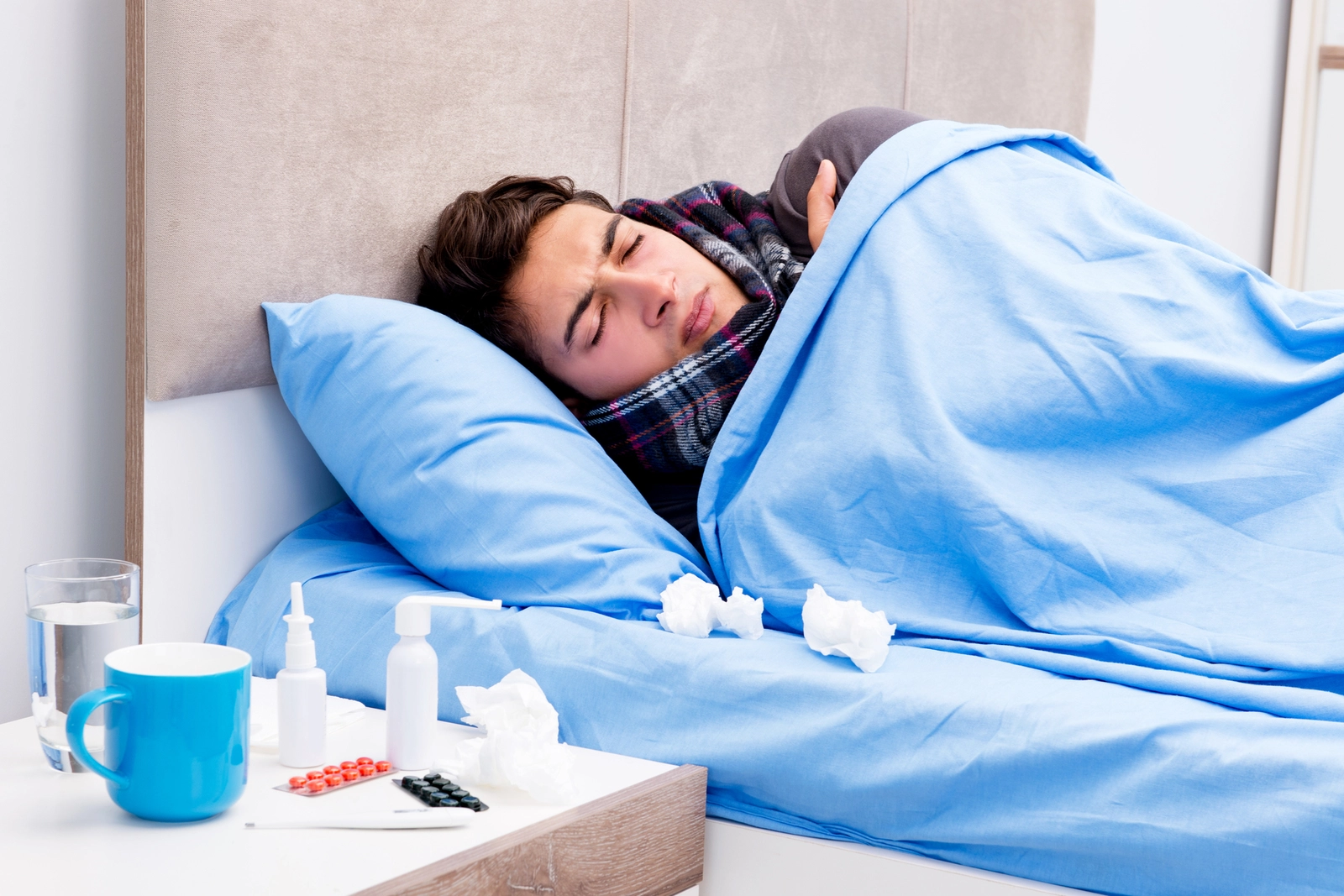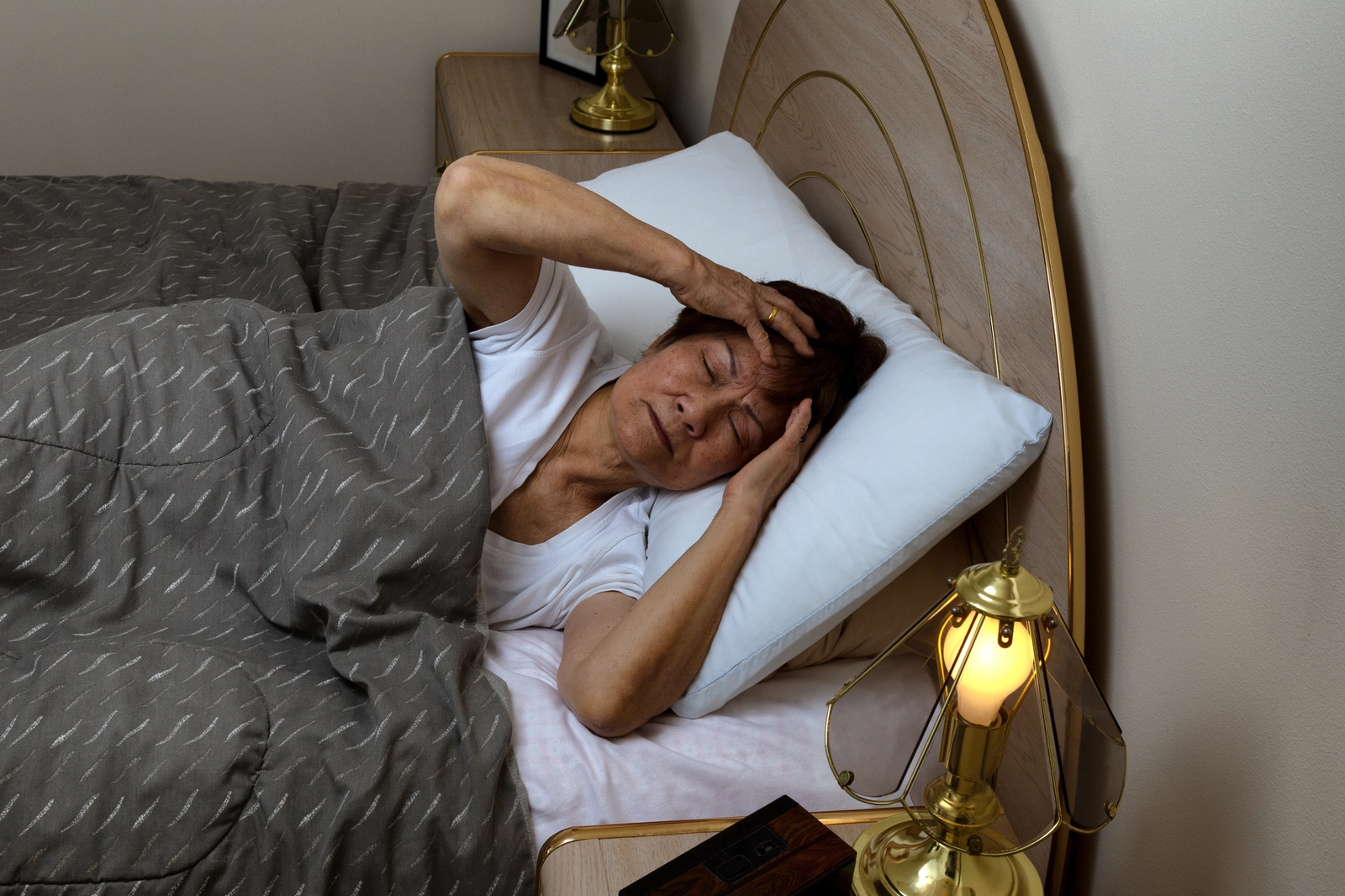Substances | 5 min read
Does NyQuil Make You Sleepy? Side Effects and Risks
Medically Reviewed By

On November 18, 2024
Written By
On November 18, 2024

What you will learn
- NyQuil is a line of cold and flu medications that relieve symptoms that may inhibit restful sleep.
- Drowsiness is a common effect of many NyQuil products and ingredients, including doxylamine and dextromethorphan.
- Though NyQuil can help you sleep with a cold or flu, it’s not intended as a sleep aid or for long-term use.
- Misusing NyQuil for its sleep effects can have serious risks, including tolerance, dependence, and severe side effects.
NyQuil is a line of cold and flu medications made by Vicks to relieve symptoms that can affect your ability to sleep. Several ingredients in NyQuil can induce sleepiness, including doxylamine, a sedating antihistamine, and dextromethorphan, a cough suppressant.[1]
The drowsiness caused by NyQuil may lead some to misuse it as a sleep aid instead of a cold and flu medication. Doing so can be ineffective and dangerous because of common side effects, especially at high doses.
What Is NyQuil?
NyQuil is a popular over-the-counter (OTC) combination cold and flu medication. Vicks produces the brand and includes a line of products, not just one. While the active ingredients vary, all NyQuil products contain an antihistamine to help you sleep. Many also contain acetaminophen for pain relief and dextromethorphan for cough suppression.
Like other combination cold medications, NyQuil products can simultaneously help you treat multiple cold and flu symptoms. However, the product has risks and side effects, including severe drowsiness.
Why Does NyQuil Make You Sleepy?
There are many NyQuil products to choose from, most of which cause you to feel sleepy. Typically, drowsiness starts about a half hour after taking NyQuil.[2] Here are some of the ingredients found in NyQuil products that can cause drowsiness, but keep in mind that formulations can vary:
Acetaminophen
Acetaminophen is a common pain reliever that targets symptoms like minor aches and pains, fever, headache, and sore throat. When taken at the recommended dosages, acetaminophen has relatively mild side effects.
High doses of acetaminophen can be dangerous. If you take more acetaminophen than what’s safe for you, it can cause liver damage. The recommended maximum daily dose of acetaminophen is 3,000 milligrams (mg), but the difference between a safe dose and a dose that could harm your liver is small.[3]
Acetaminophen is sold under several brand names, including Tylenol, and it’s found in NyQuil Cold and Flu Nighttime Relief, NyQuil Severe Cough, Cold, and Flu Nighttime Relief, and NyQuil High Blood Pressure Cold and Flu Medicine.
Dextromethorphan HBr
Dextromethorphan is a cough suppressant that works by reducing the brain signals that cause coughing. The side effects are typically mild but include drowsiness, restlessness, lightheadedness, and gastrointestinal symptoms.[4]
Dextromethorphan HBr is found in NyQuil Cold and Flu Nighttime Relief, NyQuil Severe Cough, Cold, and Flu Nighttime Relief, NyQuil Cough DM and Congestion Medicine, and NyQuil High Blood Pressure Cold and Flu Medicine.
Doxylamine Succinate
Doxylamine succinate is an antihistamine that works by blocking the action of histamine, a substance associated with allergy symptoms. Doxylamine succinate helps to relieve sneezing, sinus congestion, and runny nose by targeting histamine. Common side effects include drowsiness, headaches, and sinus dryness.[5]
Several NyQuil products contain doxylamine succinate, including NyQuil Cold and Flu Nighttime Relief, NyQuil Severe Cough, Cold, and Flu Nighttime Relief, NyQuil Cough DM and Congestion Medicine, NyQuil High Blood Pressure Cold and Flu Medicine.
Phenylephrine HCl
Phenylephrine HCl is a decongestant that helps to relieve sinus congestion. It doesn’t cause drowsiness but can cause dizziness, upset stomach, and headache.[6]
Several products contain phenylephrine HCl, including NyQuil Severe Cough, Cold, and Flu Nighttime Relief and NyQuil Cough DM and Congestion Medicine.
How Soon Do You Feel Sleepy After Taking NyQuil?
NyQuil usually causes drowsiness about a half hour after taking the medication. Typically, NyQuil is taken just before bedtime to ensure you have a full night’s rest while the effects wear off. Because NyQuil causes drowsiness, it may not be safe to drive or perform other potentially dangerous activities until the effects of the medication have worn off.
Can NyQuil Be Used as a Sleep Aid?
NyQuil is not designed to be used as a sleep aid but rather as a cold and flu medication that may help with symptoms that prevent a restful night’s sleep.
Though doxylamine is an approved sleep aid in a product, it’s not intended for long-term use. Doxylamine can build tolerance quickly, which is when your body gets used to the drug’s effects and needs more to get the same effects. Taking it for longer than two weeks can cause it to become less effective and increase the risks of side effects.
Other ingredients in NyQuil, including acetaminophen and dextromethorphan, shouldn’t be taken more than recommended. Excessive use can be dangerous and may cause side effects like dry mouth, headaches, dizziness, and skin rashes.
If you take high doses of acetaminophen or combine NyQuil with other drugs containing acetaminophen, it can cause serious liver damage. NyQuil products have several potential interactions, including MAO inhibitors like isocarboxazid, phenelzine, rasagiline, selegiline, and tranylcypromine.[7]
NyQuil products may not be recommended for everyone, including people who are pregnant, breastfeeding, or have coexisting medical conditions. Adults over 65 may be more sensitive to NyQuil side effects, such as dry mouth and confusion.
Is NyQuil Addictive?
You’re unlikely to develop an addiction to NyQuil from recommended use. While NyQuil isn’t addictive the way some other drugs are, it’s possible to develop dependence with regular use or misuse. If you stop taking it suddenly, withdrawal can occur with symptoms like anxiety, stomach pain, cravings, and rebound insomnia.
Many NyQuil products contain dextromethorphan, an active ingredient that works as a cough suppressant. In high doses, dextromethorphan can cause euphoria and hallucinations. Some people may misuse NyQuil to get high because it’s easier to obtain than illicit drugs.
Misusing NyQuil for dextromethorphan can mimic the effects of PCP, a dangerous hallucinogenic drug. The effects include impaired coordination and judgment, especially in combination with alcohol, acetaminophen, and antidepressants.[8] There are serious risks as well, including heart attack, seizures, liver damage, and death.
Tips to Improve Sleep
Insomnia is a common condition that affects 30% of adults, leading many to seek out solutions. Misusing NyQuil as a sleep aid can have dangerous effects, but there are options to try to improve your sleep quality and duration:
- Turn off electrical devices, use blackout curtains, and run a white noise machine to keep the bedroom cool, dark, and quiet.
- Stick to a sleep schedule with a set bedtime and wake time, even on weekends.
- Create a “slowdown” bedtime routine with calm, relaxing activities like listening to music, taking a hot bath, or reading a book.
- Avoid caffeine, alcohol, and nicotine at night, which can make it difficult to sleep and may disrupt restful sleep.
- Exercise regularly to help with sleep, but avoid rigorous exercise before bedtime.
- Avoid taking long naps or napping later in the day, as this can impact your nighttime rest.
- Don’t spend too long lying awake in bed, as it can increase anxiety and make it harder to sleep.
- Before bedtime, avoid blue light from televisions, cell phones, tablets, or computer screens.
NyQuil Is Not a Sleep Aid
If you have persistent insomnia and poor sleep quality that isn’t helped by lifestyle changes, you may have an underlying physical or mental health condition. Talk to your doctor about your symptoms and treatment options for insomnia. Misusing NyQuil as a sleep aid is not only ineffective but can leave you at risk of serious adverse health effects.
Frequently Asked Questions About NyQuil and Drowsiness
NyQuil can make you feel drowsy within 30 minutes, but you may not feel the full effects for up to an hour. The sedative effects typically last several hours through the night, but you may have some next-day drowsiness.
NyQuil products vary in their ingredients. Some products that contain alcohol include NyQuil Cold and Flu Nighttime Relief Liquid, Original Flavor, NyQuil VapoCool Severe Cold and Flu Liquid + Congestion, and NyQuil High Blood Pressure Cold and Flu Medicine.[9] Alcohol is considered an inactive ingredient in NyQuil.
Yes, NyQuil can make it hard to wake up because it’s intended to help you sleep with cold and flu symptoms. Feeling tired or groggy the next morning is a common side effect.
Ascendant New York Editorial Guidelines
Here at Ascendant New York, we understand the importance of having access to accurate medical information you can trust, especially when you or a loved one is suffering from addiction. Find out more on our policy.
[1,2] Does Nyquil put you to sleep?. Drugs.com. (n.d.-k). Retrieved from https://www.drugs.com/medical-answers/nyquil-put-you-sleep-3565851/ on 2024, November 12.
[3] Mayo Foundation for Medical Education and Research. (n.d.-a). Acetaminophen (oral route, rectal route). Mayo Clinic. Retrieved from https://www.mayoclinic.org/drugs-supplements/acetaminophen-oral-route-rectal-route/description/drg-20068480 on 2024, November 12.
[4] WebMD. (n.d.). Dextromethorphan: Uses, side effects, interactions, pictures, warnings & dosing. WebMD. Retrieved from https://www.webmd.com/drugs/2/drug-363/dextromethorphan-hbr-oral/details on 2024, November 12.
[5] Brott, N. R. (2023, June 5). Doxylamine. StatPearls [Internet]. Retrieved from https://www.ncbi.nlm.nih.gov/books/NBK551646/#:~:text=Doxylamine%20is%20a%20medication%20used,over%2Dthe%2Dcounter%20medication on 2024, November 12.
[6] WebMD. (n.d.-b). Phenylephrine oral: Uses, side effects, interactions, pictures, warnings & dosing. WebMD. Retrieved from https://www.webmd.com/drugs/2/drug-21821/phenylephrine-oral/details on 2024, November 12.
[7] Does Nyquil put you to sleep?. Drugs.com. (n.d.-k). Retrieved from https://www.drugs.com/medical-answers/nyquil-put-you-sleep-3565851/ on 2024, November 12.
[8] Martinak, B., Bolis, R. A., Black, J. R., Fargason, R. E., & Birur, B. (2017, September 15). Dextromethorphan in cough syrup: The poor man’s psychosis. Psychopharmacology bulletin. Retrieved from https://www.ncbi.nlm.nih.gov/pmc/articles/PMC5601090/ on 2024, November 12.
[9] Does Nyquil have alcohol in it?. Drugs.com. (n.d.-k). Retrieved from https://www.drugs.com/medical-answers/nyquil-alcohol-3565849/#:~:text=Examples%20of%20Nyquil%20products%20that,Severe%20Cold%20%26%20Flu%20Liquid%20%2B%20Congestion on 2024, November 12.




